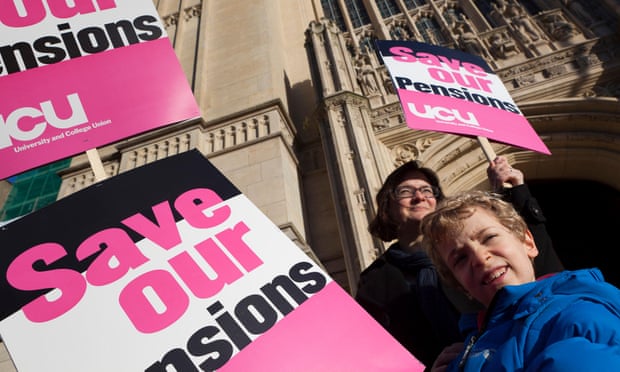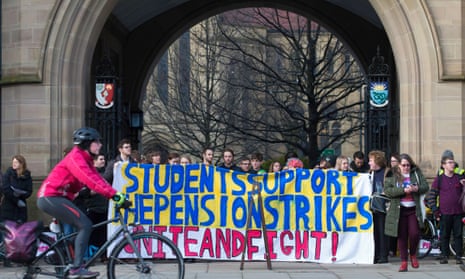University bosses are under mounting pressure from the government to return to talks to try to end sweeping strike action by staff that brought widespread disruption to campuses across the UK.
As tens of thousands of lecturers and other staff staged a mass walkout on Thursday in protest against changes to their pensions, the government intervened to try to bring the two sides back to the negotiating table.
Students turned out in freezing conditions to support their teachers on picket lines up and down the country, and in London’s Tavistock Square a small group of demonstrators carrying banners and drums occupied the headquarters of Universities UK (UUK), which represents university employers.
The industrial action is the biggest ever seen in UK universities. The strike will continue on Friday and is scheduled to last for 14 days, spread over a month across 65 universities. If a solution is not found, staff are threatening to extend the dispute to disrupt final-year exams and graduation ceremonies.
Increasingly frustrated by the impasse in the long-running dispute, the universities minister, Sam Gyimah, urged both sides to return to negotiations to avoid further disruption for students whose lectures and tutorials cancelled as a result of Thursday’s industrial action.
“I am deeply concerned about the impact this strike will have on students, who deserve to receive the education that they are paying for. For many, this is a vital time in their studies,” he said.
Gyimah said he had spoken to UUK and the University and College Union (UCU), which represents striking staff. “I call on them to get back to the negotiating table, without pre-conditions, and to find a solution that avoids further disruption to students,” he said.
Quick GuideWhy are university staff striking?
Show

Why are university staff striking?
University staff who are members of the University and College Union are angry at proposed changes to their pensions, which they argue could leave them up to £10,000 a year worse off when they retire. UCU say this would result in a loss more than £200,000 over the course of a retirement for a typical member of staff. Universities UK wants to change the Universities Superannuation Scheme from a defined benefit scheme – giving a guaranteed retirement income – to a defined contribution scheme, which would mean pensions would be subject to changes in the stock market. The union says young lecturers would be worst affected, with some losing up to half their pensions.
What is the argument for the changes?
Universities UK says its pension scheme has a £6bn deficit and it have a legal duty to put in place a credible plan to tackle it by this summer. Without reform, pensions contributions would have to rise steeply – and would mean spending cuts in other areas such as teaching, student support and research. Universities UK says that even after the changes the scheme would compare well with employer contributions double the private sector average.
What about students?
About 80,000 students at 30 of the universities affected have signed petitions. Many are supportive of striking staff but are demanding compensation for the hours of tuition they will miss because of the strikes. Students in England pay £9,250 a year, and have rights under consumer law. Whether these rights apply to industrial disputes is untested.
“Where any strike action takes place, we expect universities to keep a close eye on the impact on students, and to put in place measures to maintain the quality of education that they should receive.”
The strike comes amid heated debate within the sector about the high cost and ultimate value of some university degrees. The prime minister announced a review of higher education earlier this week as concerns grew that students are graduating with debts of more than £50,000 at the same time as vice-chancellors are receiving substantial pay rises.
A UCU spokeswoman said the union was delighted with the turnout on picket lines. where many were first-timers.
Chris Knutsen, a final-year economics and politics students at the University of Bath – where the vice-chancellor Dame Glynis Breakwell recently agreed to step down after outcry over her £468,000 salary – was among those on the picket line. Breakwell is a director of the Universities Superannuation Scheme (USS) at the centre of the pensions dispute.
“I see it as incredibly important to protect pensions so that the best teachers are attracted to academia, and pensions are a massive part of that,” Knutsen said. “I’m a bit worried about my work, but it’s forcing me to take the initiative and work autonomously.”
Hazem Raad, who escaped the war in Syria to study in the UK, was also supporting university staff. “We chose to study in a country of civil rights, and when those rights are compromised we have an obligation to stand in solidarity against the abusers.”
A small number of vice-chancellors broke ranks with UUK to come out in support of their staff, among them Stuart Corbridge of Durham University and Chris Day of Newcastle University.
Some parents were less supportive of strike action. One mother whose son is a final-year student at Southampton University, said: “I find the situation whereby uncaring academics can simply take their grievances out on young and some quite vulnerable students without any consideration of the consequences absolutely shocking.”
Q&AAre you taking part in or affected by university strikes?
Show
Whether you are a university lecturer or a student affected by the strikes, we want to hear from you and understand the issues from your perspective.
Share your views and experiences using our encrypted form here. One of our journalists may contact you to discuss further and we will feature some of your contributions in our reporting.
A YouGov poll conducted on the eve of the strike suggested that a majority of students support the industrial action and think universities are most to blame.
Overall, 61% of students said they supported the strikes; 50% blamed the university employers for the dispute that led to Thursday’s industrial action, 20% thought staff and universities were equally to blame and 2% blamed their lecturers.
The strike looks likely to be one of the biggest union disputes since the government made industrial action harder with new legislation.
UCU members are striking because they claim that proposed changes to the USS will leave a typical lecturer almost £10,000 a year worse off in retirement. Younger academics face the potential loss of almost half of their total retirement income, they say.
UUK says the pension scheme is £6.1bn in deficit and the only way to make it sustainable is to change it from a defined benefit scheme, giving members a guaranteed income in retirement, to a defined contribution scheme, where pensions are subject to changes in the stock market. The UCU insists the existing scheme is performing well and UUK’s refusal to compromise has left them no alternative but to strike.
Attention also turned to the £124m running costs of the USS after the BBC reported that its chief executive, Bill Galvin, received a 17% pay rise this year, taking his salary from £484,000 to £566,000. Two other staff reportedly earned more than £1m each.
UCU’s general secretary, Sally Hunt, said: “Students should never have been put in this position. We have been calling for talks for weeks either directly or through Acas, so if UUK are willing to now meet without preconditions with a view to resolving this dispute this is good news.”
